
Diversify The Media You Consume
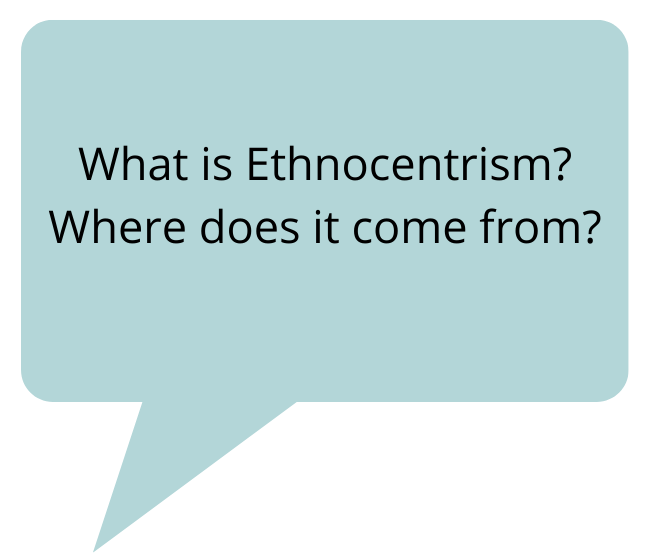
The word Ethnocentrism derives from ‘ethnicity’, which refers to an individual’s belonging to a group with which they share common cultural, historic, linguistic, and religious/spiritual traits. The term was coined by William G. Sumner (1906), and quickly gained wide popularity among social scientists. He described it as a view by which one’s group is the "center of everything", and other groups are scaled and rated in reference to it. He also came up with the concepts of ingroup favoritism and outgroup derogation that he considered a universal social differentiation among humans. Sumner made these invaluable observations, but he was not critical of them. He assumed that ingroup attachment invariably led to outgroup hate. However, studies in various disciplines seriously question such assumptions and exemplify the various measures that researchers have employed to argue otherwise (Pettigrew, 2004).
Let’s discuss first whether ethnocentrism is unavoidable and inherent, as Sumner suggested? More recent research approaches the topic rather critically. Ethnicity -in the end- is only one factor of social difference that people draw on, and it is a social construct. Within a social interaction, people can focus on their similarities rather than differences. Actually many integrations and migration policies are aiming exactly at that. Also, the contact hypothesis (Allport, 1954) suggests that negative attitudes held by one group towards another are caused by a lack of knowledge about that group. Establishing positive, personal and cooperative contact between individuals with equal status might greatly improve intergroup relations among ‘conflicting’ ethnic groups through a growing recognition of similarities such as common goals (Sherif et al, 1961).
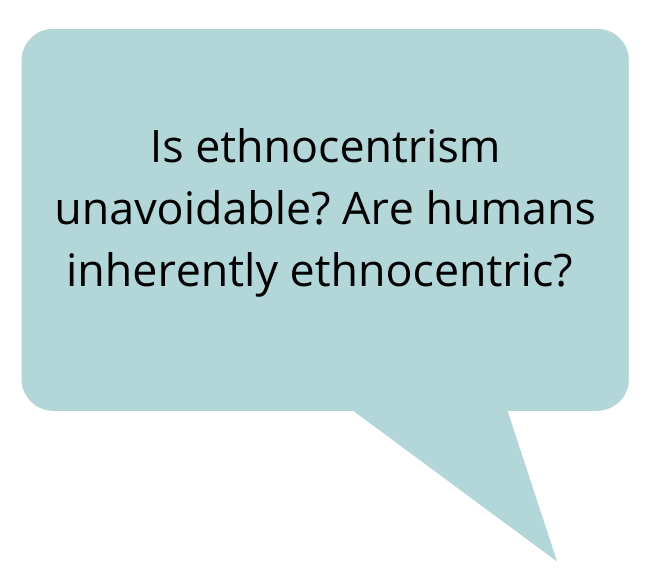
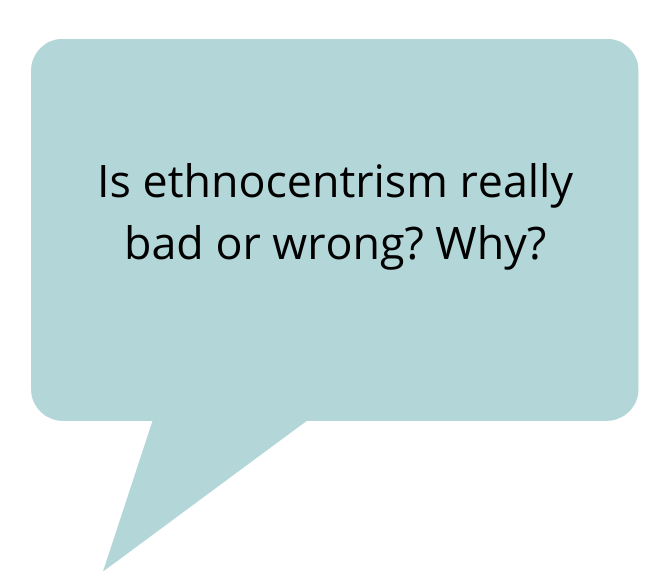
Yes, ethnocentrism is bad and wrong. There may be obvious functions of ethnocentrism for the ingroup such as cohesiveness, patriotism, pride, and loyalty. However, these often hint at a sense of ingroup superiority (Bizumic & Duckitt, 2012). In addition to making harmonious intra-group relations possibly more problematic, ethnocentrism can lead to arrogant inflexibility and blindness that prevent actions vital for the ingroup’s own progress and prosperity. It has the great potential of harming one’s own group as well as relations between groups.
As a practice, ethnocentrism consists of evaluating other cultures from the perspective of one's own, and therefore it can lead to a partial understanding of other social groups. This means, ethnocentrism creates a distorted, therefore wrong, understanding and analysis of social reality and can lead to a biased worldview.
Eurocentrism is the practice of studying and judging other societies in terms of the cultural assumptions or biases of Europe (or generally Western societies). It is the worldview fabricated by the dominance of Western capitalism. It claims that European culture reflects the unique and most progressive manifestation of the metaphysical order of history. Thus, it is an ideological, historical and moral distortion. It illegitimately appropriates Greek rationality and Christianity to legitimize its exploitation of non-European humanity (Mallick, 2008). Eurocentrism not only means rating cultures according to a generalized European scale of norms and values, but it also perpetuates the oversimplified center-periphery understanding of the world. In such understanding, the Euro-American nations and regions are accepted as “the center” as contrasted with “the periphery” that is Non-Western nations and regions. This understanding has been used to justify the expropriation of the latter by the former. (Erickson & Murphy, 2013)
Eurocentrism is closely linked with colonialism. For example, French, British, or Spanish national identity cannot be understood without acknowledging that their national self-conception is interconnected with colonial ideas such as racial hierarchy, white superiority, and religious otherness (Bauman, 1992, as cited in Mayblin, 2017). In the field of International Relations, eurocentrism is (re)articulated as a knowledge system that assumes a hierarchical binary. This binary situates ‘Europe’ as separate from the ‘non-West’ and as always ahead of its time in the progressive narratives of democracy, sovereignty, human rights. The West is seen as rational, modern, developed, in contrast to the non-West as spiritual, traditional, underdeveloped. This logic then reproduces this hierarchy by analyzing developments as if they occurred in isolation without any connection with other (non-European) spaces. (Capan, 2018)
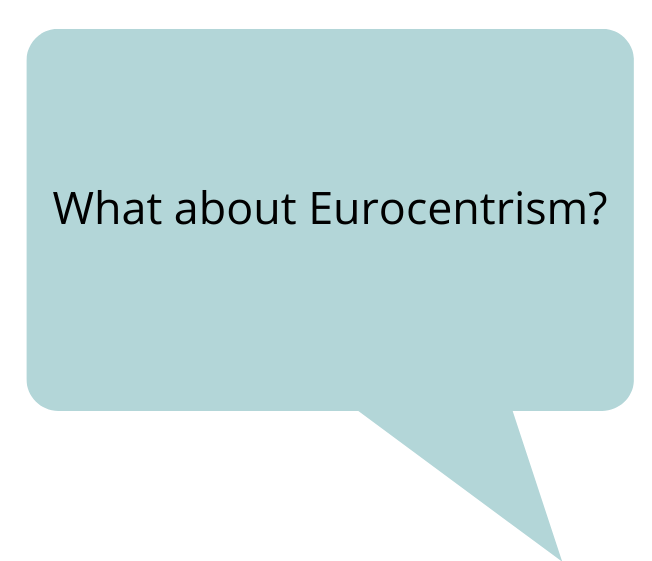
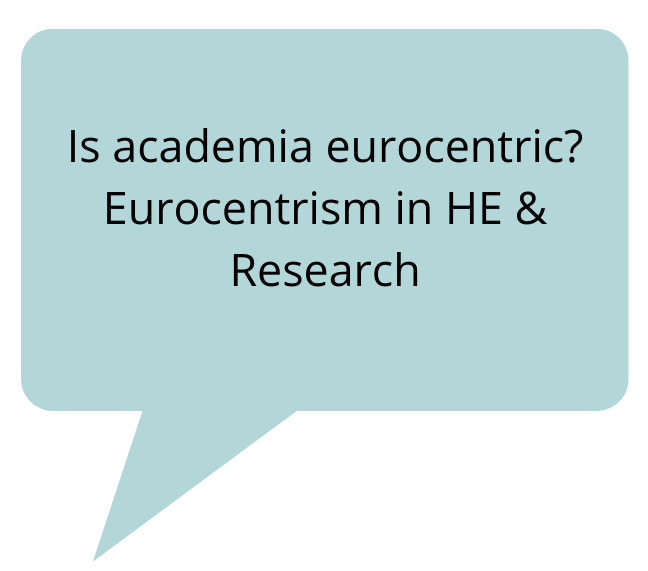
There are spaces in academia that consciously describe, understand and analyze only Western (social) reality. In other cases, the perpetuation of strictly Western or Westernized ethnocentric academic knowledge happens due to a strong (post)colonial tradition in education. This limits the possibility of understanding our multifaceted and diverse societies, starting in our classrooms. Even if you are studying in a non-Western country; your university, its staff and curriculum are not immune to eurocentrism. A lot of universities use textbooks from powerful, Western, English-speaking publishing houses -especially at bachelor level. These textbooks are filled with research findings, case studies, ideologies and examples from Western world both as a geographic location and a system of knowledge. Even when doing the research for this piece, a textbook on Applied Social psychology by Cambridge University Press was citing research cases only from the Netherlands, Canada and Australia in a chapter that is about ethnocentrism, migration and cultural diversity. This showcases perfectly the eurocentric understanding of what are regarded as core/center coded as ‘host societies’, and who are the periphery countries that send the immigrants. The sheer lack of Western to non-Western or Non-Western to Non-Western migration patterns is striking. However, it might not seem like much to a person who already is socialized to see their own Western, industrialized, rich country as the center of the world.
Moving onto a specific strain of research, we can have a look at behavioral sciences. 96% of people studied in behavioral science research are from Western, industrialized countries which makes up only 12% of the world’s population. Many researchers assume that these “standard subjects” could be representative of any population. However, a recent review of the comparative database from across the behavioral sciences shows that these subjects are particularly unusual compared with the rest of the species and that rich, Western societies are among the least representative populations one could find for generalizing about human nature (Henrich, Heine & Norenzayan, 2010).
Since social sciences ultimately inform public discourse, eurocentrism in social sciences is a major problem, Alatas, in his book “Alternative Discourses in Asian Social Science: Responses to Eurocentrism'', says eurocentrism exists within the context of 'academic or intellectual imperialism', that is, the intellectual domination of the non-Western world by the social science powerhouses (the US, the UK, France and Germany). Alatas also talks about the lack of 'alternative discourses' as opposed to the mainstream discourses, which are mainly Euro-American. The latter continues to dominate the arts and social sciences. The idea of ‘alternative discourses’, however, recognizes all civilizations and cultural practices as sources for the social sciences, meanwhile not rejecting Western social science as a whole (2006).
In discussing knowledge production and circulation in HE, we need to recognize the eurocentric framework in which universities operate while seeking to look beyond. Recent research on postcolonial examination of Eurocentrism in knowledge production shows a ‘silencing’ of marginalised forms of knowledge and advocates for the inclusion of non-western and non-white forebears of science. Among the burning issues is the dynamics in knowledge hierarchies and who gets to decide what is valid, relevant and ‘modern’ knowledge. In that sense, tensions between the educational elites and the broad population are very much reflected in HE. Excellence and quality are usually seen to be at odds with diversity and inclusion, even though homepages of universities try simultaneously to promise excellence and embrace social issues (Pfaff-Czarnecka 2019).
How can we, as university students in a Western and Westernized Academia combat Eurocentrism?
Collectively, we need to recognize and call out the Eurocentric curriculum used at the universities as well as challenge Eurocentric classroom dynamics. We need to listen to and amplify alternative voices. Moreover, there are simple strategies to combat eurocentrism individually. In this regard, we invite you to expand your worldview beyond Western knowledge systems by diversifying the media you consume and engaging in discussion. This contributes to the struggle against racism, colonialism and intellectual imperialism, defends critical thought and shows solidarity with marginalized creators. Here is a list of selected authors, scholars, content creators and artists that we brought together:

Arundhati Roy
Arundhati Roy is a non-expatriate Indian novelist, essayist and activist who is best known for her involvement in environmental and human rights causes and her award-winning novel The God of Small Things (1997). In the novel, she interrogates the culture of her native India, including its social mores and colonial history. One of her focuses is the caste system, a way of classifying people by hereditary social class that is thousands of years old. She touches upon many issues ranging from feminist perceptions, post-colonial dimensions and literary tourism to her Indianness.
Marlee Silva
Marlee Silva is an Aboriginal woman from the Gamilaroi and Dunghutti nations. She is the first Indigenous Australian woman to study at Stanford University. She is the host of the Tiddas 4 Tiddas podcast, and the author of the novel “My Tidda, My Sister”. The voices of First Nations women that Marlee weaves through her novel provide a rebuttal to the idea that 'you can’t be what you can’t see'. Featuring colorful artwork by artist Rachael Sarra, this book is a celebration of the Indigenous female experience through truth-telling. Some stories are heartwarming, while others shine a light on the terrible realities for many Australian Indigenous women. For non-Indigenous women, it demonstrates the diversity of what success can look like and offers an insight into the lives of their Indigenous sisters and peers.


Tia Wood
Tia Wood (@tiamiscihk on TikTok and Instagram) is a singer and creator whose online presence celebrates her Cree and Salish cultures. She uses these platforms to educate others about her people’s history and traditions through Indigenous singing, informational videos and decolonized fashion. She praises the rise of contemporary Indigenous fashion that is bridging the gap between Indigenous regalia and tradition with what it looks like to be a modern Indigenous woman today. Her online presence engages in different forms of activism, raising her voice for the rights of the community and spreading awareness of indigenous issues, song & appreciation for the culture.
Chimamanda Ngozi Adichie
Chimamanda Ngozi Adichie is a Nigerian novelist and essayist whose work drew extensively on the Biafran war in Nigeria during the 1960s. Her work has been translated into over thirty languages. Shas been invited to speak around the world. Her TEDxTalks “The Danger of A Single Story” and “We Should All Be Feminists” have started a worldwide conversation about feminism, race and gender. Apart from her notable novels like Americanah, Purple Hibiscus, and Half of a Yellow Sun, she released The Thing Around Your Neck, a critically acclaimed collection of short stories.


Xiran Jay Zhao
Xiran Jay Zhao is a first-generation Hui Chinese immigrant from small-town China to Canada. They are a YouTuber and internet personality as well as a bestselling author of sci-fi & fantasy. Their books are deeply rooted in Chinese history and mythology. In September 2020, Zhao went viral, first on a Twitter thread followed by their first YouTube video, for their criticisms of Disney's live-action Mulan remake and its cultural inaccuracies. They still create long Youtube videos about Chinese history and culture, critical media analysis of Chinese/Asian and queer representations.
Bahman Ghobadi
Bahman Ghobadi was born in a city near the Iran-Iraq border in the province of Kurdistan, Iran. He was the first son in a family of seven siblings. At the age of 12, civil disputes caused his entire family to immigrate within Iran. His first feature film “A Time for Drunken Horses” was the first Kurdish film produced in Iran. The film won the Caméra d'Or at the Cannes Film Festival in 2000. Ghobadi belongs to the "new wave" of Iranian cinema. His other notable works include “No One Knows About Persian Cats” and “Turtles Can Fly”. As an exiled filmmaker himself, he penned an open letter to Movie Academy to include “One Representative From Exiled Artists” for Oscar consideration in 2021.

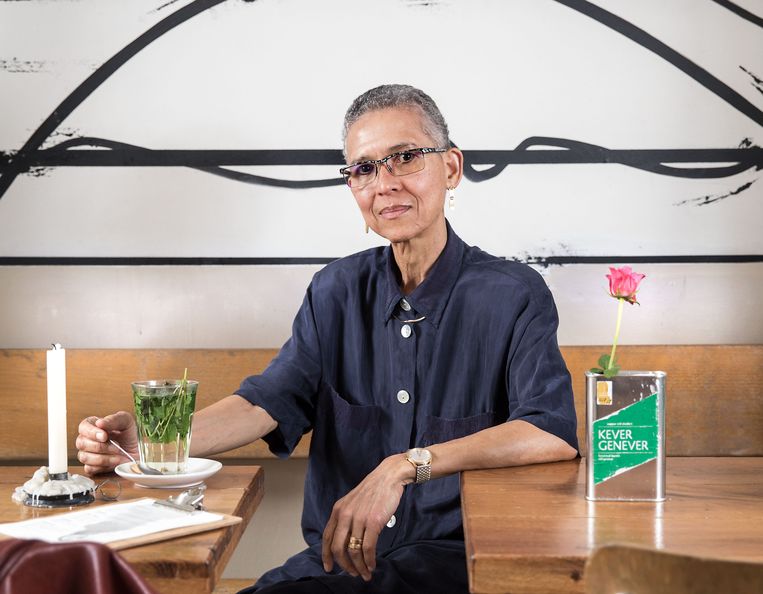
Philomena Essed
Philomena Essed was born in 1955 in Utrecht and is the daughter of Surinamese parents. Essed is a pioneer in the field of racism research and the simultaneous operation of different dominance systems. In the Netherlands, she is best known for her books Everyday Racism (1984), Insight into everyday racism (1991), and Understanding Everyday Racism (1991). Her work is internationally renowned for its originality and for introducing groundbreaking concepts such as ‘everyday racism’, 'gendered racism', and 'entitlement racism', as well as the phenomenon of 'social and cultural cloning' in a handful of articles. Her work contributes greatly to the debates in critical race theory and gendered racism.
John Charles Chasteen
John Charles is a professor and cultural historian of Latin America whose work has explored topics ranging from gaucho knife fights and guerrilla insurgencies to the history of carnival and popular dance. His research interests center chronologically on the nineteenth century and extend geographically to Brazil, the Caribbean, and the Río de la Plata. Among his academic interests is the development of Latin American nationalism and national identities. His book titled Born in Blood and Fire: A Concise History of Latin America (2001) is regarded as one of the most readable, highly regarded, and affordable history of Latin America for our times.

References Alatas, S. F. (2006). Alternative Discourses in Asian Social Science: Responses to Eurocentrism. Thousand Oaks: Sage Publications. Allport, G. W. (1954). The nature of prejudice. Addison-Wesley. Bauman, Z. (1992). Soil, Blood and Identity. The Sociological Review, 40(4), 675–701. Bizumic, B., & Duckitt, J. (2012). What Is and Is Not Ethnocentrism? A Conceptual Analysis and Political Implications. Political Psychology, 33(6), 887–909. Capan, Z. (2018). Eurocentrism and the construction of the ‘Non-West’ ?????????????? https://youtu.be/QjcCmERmIMo?list=PLJicmE8fK0EiUroVhuEyeOYkAGAAB58Xx Erickson, P. A., & Murphy, L. D. (2013). A history of anthropological theory. Toronto: University of Toronto Press. Henrich, J., Heine, S. J., & Norenzayan, A. (2010). The weirdest people in the world? Behavioral and Brain Sciences, 33(2-3), 61–83. https://doi.org/10.1017/S0140525X0999152X https://deadline.com/2021/09/iranian-filmmaker-bahman-ghobadi-movie-academy-exiled-artists-oscars-1234846192/ Mallick, Sambit. (2008). Book Review: Alternative Discourses in Asian Social Science: Responses to Eurocentrism by Syed Farid Alatas. The Indian Historical Review (35), pp. 311-314. Mayblin, L. (2017). Soil, Blood and Identity [Online]. The Sociological Review Magazine. Retried from https://thesociologicalreview.org/collections/zygmunt-bauman/soil-blood-and-identity/ Sherif, M. & University of Oklahoma (1961). Intergroup conflict and cooperation: The Robbers Cave experiment. Norman: University Book Exchange. Sumner, W. G. (1906). Folkways. Ginn, New York, NY. Pettigrew, T. F. (2004). Ethnocentrism. In K. Kempf-Leonard (Ed.), Encyclopedia of Social Measurement. San Diego, CA: Academic Press, 2004. Pettigrew, T. (1973). Review of Ethnocentrism: Theories of Conflict, Ethnic Attitudes and Group Behavior. Political Science Quarterly. Vol. 88, No. 3 (Sep., 1973), pp. 488-489. www.dictionary.com/browse/ethnicity
